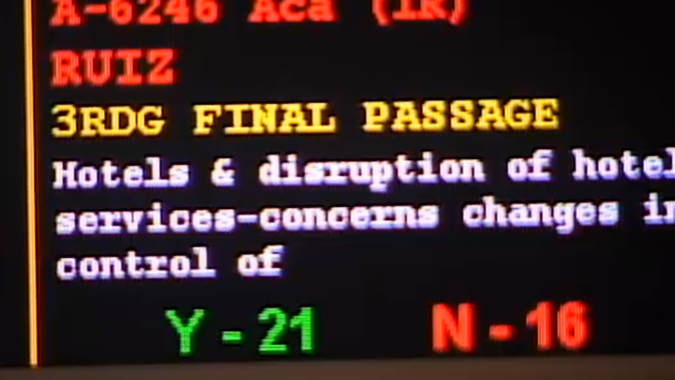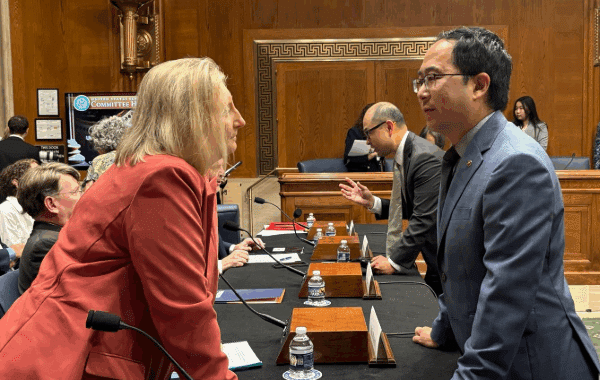Several contested and controversial bills that were bad for business were voted out of the Senate and Assembly on Monday, the final day of the 219th Legislative Session.
And some of those bills now on Gov. Phil Murphy’s desk had close votes.
To see how your legislator voted on these bills that will negatively impact business in the state of New Jersey, see below:
S-1559/A-1659 – The controversial “bad faith” insurance bill, strongly opposed by NJBIA, narrowly passed both houses of the Legislature on Monday. NJBIA is urging the Governor to veto this legislation, which would drive up the cost of auto insurance premiums and return New Jersey to the days when it had the nation’s highest auto insurance rates.
[toggle title="How did the Senate vote?"]
- Addiego, Dawn Marie - Yes
- Bateman, Christopher - No
- Beach, James - Yes
- Bucco, Anthony M. - Yes
- Codey, Richard J. - Yes
- Connors, Christopher J. - No
- Corrado, Kristin M. - No
- Cruz-Perez, Nilsa I. - Yes
- Cryan, Joseph P. - Yes
- Cunningham, Sandra B. - Yes
- Diegnan, Patrick J. - Yes
- Doherty, Michael J. - No
- Gill, Nia H. - Yes
- Gopal, Vin - Yes
- Greenstein, Linda R. - Yes
- Holzapfel, James W. - Not Voting
- Kean, Thomas H. - No
- Lagana, Joseph A. - Not Voting
- Madden, Fred H. - Yes
- O'Scanlon, Declan J. - No
- Oroho, Steven V. - No
- Pennacchio, Joseph - No
- Polistina, Vincent J. - No
- Pou, Nellie - Yes
- Rice, Ronald L. - No
- Ruiz, M. Teresa - Yes
- Sacco, Nicholas J. - Yes
- Sarlo, Paul A. - Yes
- Schepisi, Holly T. - No
- Scutari, Nicholas P. - Yes
- Singer, Robert W. - No
- Singleton, Troy - Not Voting
- Smith, Bob - Yes
- Stack, Brian P. - Yes
- Sweeney, Stephen M. - Yes
- Testa, Michael L. - Yes
- Thompson, Samuel D. - No
- Turner, Shirley K. - Not Voting
- Vitale, Joseph F. - Yes
- Weinberg, Loretta - Not Voting
[/toggle]
[toggle title="How did the Assembly vote?"]
Yes: 44; No: 27; Not Voting: 4; Abstain: 5
- Armato, John - Yes
- Auth, Robert - No
- Benson, Daniel R. - Yes
- Bergen, Brian - No
- Bramnick, Jon M. - Yes
- Burzichelli, John J. - Abstain
- Calabrese, Clinton - Yes
- Caputo, Ralph R. - Yes
- Carter, Linda S. - Yes
- Catalano, John - No
- Chaparro, Annette - Yes
- Chiaravalloti, Nicholas - Abstain
- Clifton, Robert D. - No
- Conaway, Herb - Yes
- Coughlin, Craig J. - Yes
- Dancer, Ronald S. - Yes
- Danielsen, Joe - No
- DeAngelo, Wayne P. - Yes
- DeCroce, BettyLou - No
- DeFuccio, DeAnne C. - No
- DePhillips, Christopher P. - No
- DiMaio, John - No
- DiMaso, Serena - No
- Downey, Joann - Yes
- Dunn, Aura K. - Yes
- Egan, Joseph V. - Yes
- Freiman, Roy - Abstain
- Giblin, Thomas P. - Yes
- Gove, DiAnne C. - No
- Greenwald, Louis D. - No
- Holley, Jamel C. - No
- Houghtaling, Eric - Yes
- Jasey, Mila M. - Not Voting
- Jimenez, Angelica M. - Yes
- Johnson, Gordon M. - Yes
- Karabinchak, Robert J. - Yes
- Kean, Sean T. - Yes
- Kennedy, James J. - Yes
- Lampitt, Pamela R. - No
- Lopez, Yvonne - Yes
- Mazzeo, Vincent - Yes
- McClellan, Antwan L. - No
- McGuckin, Gregory P. - Not Voting
- McKeon, John F. - No
- McKnight, Angela V. - Yes
- Mejia, Pedro - Yes
- Moen, William F. - Yes
- Moriarty, Paul D. - Yes
- Mosquera, Gabriela M. - Not Voting
- Mukherji, Raj - Yes
- Munoz, Nancy F. - Yes
- Murphy, Carol A. - Yes
- Peters, Ryan E. - No
- Peterson, Erik - No
- Pintor Marin, Eliana - Yes
- Quijano, Annette - Yes
- Reynolds-Jackson, Verlina - Yes
- Rooney, Kevin J. - No
- Rumpf, Brian E. - No
- Schaer, Gary S. - Yes
- Scharfenberger, Gerry - No
- Simonsen, Erik K. - No
- Space, Parker - No
- Spearman, William W. - Yes
- Speight, Shanique - Yes
- Stanfield, Jean - No
- Stanley, Sterley S. - Yes
- Sumter, Shavonda E. - Yes
- Swain, Lisa - Yes
- Taliaferro, Adam J. - Abstain
- Thomson, Edward H. - No
- Timberlake, Britnee N. - Yes
- Tucker, Cleopatra G. - Not Voting
- Tully, P. Christopher - Yes
- Vainieri Huttle, Valerie - Yes
- Verrelli, Anthony S. - Yes
- Webber, Jay - No
- Wimberly, Benjie E. - Abstain
- Wirths, Harold J. - No
- Zwicker, Andrew - Yes
[/toggle]
S-4207/A-6119 – This legislation, opposed by NJBIA. would severely limit the ability of small businesses to bid on public works contracts by stiflling their ability to meet apprenticeship program requirements. If signed into law, it will be extremely difficult for small businesses to obtain public contracts.
[toggle title="How did the Senate vote?"]
Addiego, Dawn Marie - Yes
Bateman, Christopher - Yes
Beach, James - Yes
Bucco, Anthony M. - Not Voting
Codey, Richard J. - Yes
Connors, Christopher J. - No
Corrado, Kristin M. - Yes
Cruz-Perez, Nilsa I. - Yes
Cryan, Joseph P. - Yes
Cunningham, Sandra B. - Yes
Diegnan, Patrick J. - Yes
Doherty, Michael J. - No
Gill, Nia H. - No
Gopal, Vin - Yes
Greenstein, Linda R. - Yes
Holzapfel, James W. - No
Kean, Thomas H. - Yes
Lagana, Joseph A. - Yes
Madden, Fred H. - Yes
O'Scanlon, Declan J. - No
Oroho, Steven V. - Yes
Pennacchio, Joseph - Yes
Polistina, Vincent J. - No
Pou, Nellie - Yes
Rice, Ronald L. - No
Ruiz, M. Teresa - Yes
Sacco, Nicholas J. - Yes
Sarlo, Paul A. - Yes
Schepisi, Holly T. - No
Scutari, Nicholas P. - Yes
Singer, Robert W. - No
Singleton, Troy - Yes
Smith, Bob - Yes
Stack, Brian P. - Yes
Sweeney, Stephen M. - Yes
Testa, Michael L. - No
Thompson, Samuel D. - Yes
Turner, Shirley K. - Not Voting
Vitale, Joseph F. - Not Voting
Weinberg, Loretta - Not Voting
[/toggle]
[toggle title="How did the Assembly vote?"]
- Armato, John - Yes
- Auth, Robert - No
- Benson, Daniel R. - Yes
- Bergen, Brian - No
- Bramnick, Jon M. - Yes
- Burzichelli, John J. - Yes
- Calabrese, Clinton - Yes
- Caputo, Ralph R. - Yes
- Carter, Linda S. - Yes
- Catalano, John - No
- Chaparro, Annette - Yes
- Chiaravalloti, Nicholas - Yes
- Clifton, Robert D. - No
- Conaway, Herb - Yes
- Coughlin, Craig J. - Yes
- Dancer, Ronald S. - Yes
- Danielsen, Joe - Yes
- DeAngelo, Wayne P. - Yes
- DeCroce, BettyLou - Yes
- DeFuccio, DeAnne C. - No
- DePhillips, Christopher P. - Yes
- DiMaio, John - Not Voting
- DiMaso, Serena - No
- Downey, Joann - Yes
- Dunn, Aura K. - Yes
- Egan, Joseph V. - Yes
- Freiman, Roy - Yes
- Giblin, Thomas P. - Yes
- Gove, DiAnne C. - No
- Greenwald, Louis D. - Yes
- Holley, Jamel C. - Abstain
- Houghtaling, Eric - Yes
- Jasey, Mila M. - Yes
- Jimenez, Angelica M. - Yes
- Johnson, Gordon M. - Yes
- Karabinchak, Robert J. - Yes
- Kean, Sean T. - Yes
- Kennedy, James J. - Not Voting
- Lampitt, Pamela R. - Yes
- Lopez, Yvonne - Yes
- Mazzeo, Vincent - Yes
- McClellan, Antwan L. - No
- McGuckin, Gregory P. - No
- McKeon, John F. - Yes
- McKnight, Angela V. - Yes
- Mejia, Pedro - Yes
- Moen, William F. - Yes
- Moriarty, Paul D. - Yes
- Mosquera, Gabriela M. - Yes
- Mukherji, Raj - Yes
- Munoz, Nancy F. - Yes
- Murphy, Carol A. - Yes
- Peters, Ryan E. - Not Voting
- Peterson, Erik - No
- Pintor Marin, Eliana - Yes
- Quijano, Annette - Not Voting
- Reynolds-Jackson, Verlina - Yes
- Rooney, Kevin J. - Yes
- Rumpf, Brian E. - No
- Schaer, Gary S. - Yes
- Scharfenberger, Gerry - No
- Simonsen, Erik K. - Yes
- Space, Parker - Yes
- Spearman, William W. - Yes
- Speight, Shanique - Yes
- Stanfield, Jean - No
- Stanley, Sterley S. - Yes
- Sumter, Shavonda E. - Abstain
- Swain, Lisa - Yes
- Taliaferro, Adam J. - Not Voting
- Thomson, Edward H. - Yes
- Timberlake, Britnee N. - Yes
- Tucker, Cleopatra G. - Yes
- Tully, P. Christopher - Yes
- Vainieri Huttle, Valerie - Not Voting
- Verrelli, Anthony S. - Yes
- Webber, Jay - No
- Wimberly, Benjie E. - Yes
- Wirths, Harold J. - Yes
- Zwicker, Andrew - Yes
[/toggle]
A-6246/S-4295 - This legislation requires a new owner of a hotel to offer employment for each worker previously employed by the selling owner, with no reduction of wages or benefits for 90 days. The bill also mandates the retention of these employees for an indefinite period of time beyond those 90 days.
[toggle title="How did the Senate vote?"]
Yes: 21; No: 16; Not Voting: 3; Abstain: 0
Addiego, Dawn Marie - Yes
Bateman, Christopher - No
Beach, James - Yes
Bucco, Anthony M. - No
Codey, Richard J. - Yes
Connors, Christopher J. - No
Corrado, Kristin M. - No
Cruz-Perez, Nilsa I. - Yes
Cryan, Joseph P. - Yes
Cunningham, Sandra B. - Yes
Diegnan, Patrick J. - Yes
Doherty, Michael J. - No
Gill, Nia H. - Yes
Gopal, Vin - No
Greenstein, Linda R. - Yes
Holzapfel, James W. - No
Kean, Thomas H. - No
Lagana, Joseph A. - Yes
Madden, Fred H. - Yes
O'Scanlon, Declan J. - No
Oroho, Steven V. - No
Pennacchio, Joseph - No
Polistina, Vincent J. - No
Pou, Nellie - Yes
Rice, Ronald L. - Yes
Ruiz, M. Teresa - Yes
Sacco, Nicholas J. - Yes
Sarlo, Paul A. - Yes
Schepisi, Holly T. - No
Scutari, Nicholas P. - Yes
Singer, Robert W. - No
Singleton, Troy - Not Voting
Smith, Bob - Yes
Stack, Brian P. - Yes
Sweeney, Stephen M. - Yes
Testa, Michael L. - No
Thompson, Samuel D. - No
Turner, Shirley K. - Not Voting
Vitale, Joseph F. - Yes
Weinberg, Loretta - Not Voting
[/toggle]
[toggle title="How did the Assembly vote?"]
Yes: 50; No: 28; Not Voting: 2; Abstain: 0
Armato, John - Yes
Auth, Robert - No
Benson, Daniel R. - Yes
Bergen, Brian - No
Bramnick, Jon M. - No
Burzichelli, John J. - Yes
Calabrese, Clinton - Yes
Caputo, Ralph R. - Yes
Carter, Linda S. - Yes
Catalano, John - No
Chaparro, Annette - Yes
Chiaravalloti, Nicholas - Yes
Clifton, Robert D. - No
Conaway, Herb - Yes
Coughlin, Craig J. - Yes
Dancer, Ronald S. - No
Danielsen, Joe - Yes
DeAngelo, Wayne P. - Yes
DeCroce, BettyLou - No
DeFuccio, DeAnne C. - No
DePhillips, Christopher P. - No
DiMaio, John - No
DiMaso, Serena - No
Downey, Joann - Yes
Dunn, Aura K. - No
Egan, Joseph V. - Yes
Freiman, Roy - Yes
Giblin, Thomas P. - Yes
Gove, DiAnne C. - No
Greenwald, Louis D. - Yes
Holley, Jamel C. - Yes
Houghtaling, Eric - Yes
Jasey, Mila M. - Yes
Jimenez, Angelica M. - Yes
Johnson, Gordon M. - Yes
Karabinchak, Robert J. - Yes
Kean, Sean T. - No
Kennedy, James J. - Yes
Lampitt, Pamela R. - Yes
Lopez, Yvonne - Yes
Mazzeo, Vincent - Yes
McClellan, Antwan L. - No
McGuckin, Gregory P. - No
McKeon, John F. - Yes
McKnight, Angela V. - Yes
Mejia, Pedro - Yes
Moen, William F. - Yes
Moriarty, Paul D. - Yes
Mosquera, Gabriela M. - Yes
Mukherji, Raj - Yes
Munoz, Nancy F. - No
Murphy, Carol A. - Yes
Peters, Ryan E. - No
Peterson, Erik - No
Pintor Marin, Eliana - Yes
Quijano, Annette - Not Voting
Reynolds-Jackson, Verlina - Yes
Rooney, Kevin J. - No
Rumpf, Brian E. - No
Schaer, Gary S. - Yes
Scharfenberger, Gerry - No
Simonsen, Erik K. - No
Space, Parker - No
Spearman, William W. - Yes
Speight, Shanique - Yes
Stanfield, Jean - No
Stanley, Sterley S. - Yes
Sumter, Shavonda E. - Yes
Swain, Lisa - Yes
Taliaferro, Adam J. - Yes
Thomson, Edward H. - No
Timberlake, Britnee N. - Yes
Tucker, Cleopatra G. - Yes
Tully, P. Christopher - Yes
Vainieri Huttle, Valerie - Not Voting
Verrelli, Anthony S. - Yes
Webber, Jay - No
Wimberly, Benjie E. - Yes
Wirths, Harold J. - No
Zwicker, Andrew - Yes
[/toggle]
S-2515/A4676 – This bill places an undue burden on manufacturers by setting post-consumer recycled content requirements for a variety of plastic packaging products, including rigid plastic containers, glass containers, paper and plastic carryout bags and plastic trash bags. NJBIA is asking the governor to veto the bill because the technology and markets do not yet exist to meet some of its requirements, which will subject manufacturers to burdensome delays as they wait for state environmental officials to process waivers.
[toggle title="How did the Senate vote?"]
- Addiego, Dawn Marie - Yes
- Bateman, Christopher - Yes
- Beach, James - Yes
- Bucco, Anthony M. - No
- Codey, Richard J. - Yes
- Connors, Christopher J. - No
- Corrado, Kristin M. - No
- Cruz-Perez, Nilsa I. - Yes
- Cryan, Joseph P. - Yes
- Cunningham, Sandra B. - Yes
- Diegnan, Patrick J. - Yes
- Doherty, Michael J. - No
- Gill, Nia H. - Yes
- Gopal, Vin - Not Voting
- Greenstein, Linda R. - Yes
- Holzapfel, James W. - No
- Kean, Thomas H. - No
- Lagana, Joseph A. - Yes
- Madden, Fred H. - Yes
- O'Scanlon, Declan J. - No
- Oroho, Steven V. - No
- Pennacchio, Joseph - No
- Polistina, Vincent J. - No
- Pou, Nellie - Yes
- Rice, Ronald L. - No
- Ruiz, M. Teresa - Yes
- Sacco, Nicholas J. - Yes
- Sarlo, Paul A. - Yes
- Schepisi, Holly T. - No
- Scutari, Nicholas P. - Yes
- Singer, Robert W. - No
- Singleton, Troy - Yes
- Smith, Bob - Yes
- Stack, Brian P. - Yes
- Sweeney, Stephen M. - Yes
- Testa, Michael L. - No
- Thompson, Samuel D. - No
- Turner, Shirley K. - Not Voting
- Vitale, Joseph F. - Yes
- Weinberg, Loretta - Not Voting
[/toggle]
[toggle title="How did the Assembly vote?"]
Yes: 48; No: 26; Not Voting: 3; Abstain: 3
Armato, John - Yes
Auth, Robert - No
Benson, Daniel R. - Yes
Bergen, Brian - No
Bramnick, Jon M. - No
Burzichelli, John J. - Yes
Calabrese, Clinton - Yes
Caputo, Ralph R. - Yes
Carter, Linda S. - Yes
Catalano, John - No
Chaparro, Annette - Yes
Chiaravalloti, Nicholas - Yes
Clifton, Robert D. - Abstain
Conaway, Herb - Yes
Coughlin, Craig J. - Yes
Dancer, Ronald S. - No
Danielsen, Joe - Yes
DeAngelo, Wayne P. - Yes
DeCroce, BettyLou - No
DeFuccio, DeAnne C. - No
DePhillips, Christopher P. - No
DiMaio, John - No
DiMaso, Serena - No
Downey, Joann - Yes
Dunn, Aura K. - Abstain
Egan, Joseph V. - Yes
Freiman, Roy - Yes
Giblin, Thomas P. - Yes
Gove, DiAnne C. - No
Greenwald, Louis D. - Yes
Holley, Jamel C. - Yes
Houghtaling, Eric - Yes
Jasey, Mila M. - Yes
Jimenez, Angelica M. - Yes
Johnson, Gordon M. - Yes
Karabinchak, Robert J. - Yes
Kean, Sean T. - No
Kennedy, James J. - Yes
Lampitt, Pamela R. - Abstain
Lopez, Yvonne - Yes
Mazzeo, Vincent - Yes
McClellan, Antwan L. - No
McGuckin, Gregory P. - No
McKeon, John F. - Yes
McKnight, Angela V. - Yes
Mejia, Pedro - Yes
Moen, William F. - Yes
Moriarty, Paul D. - Yes
Mosquera, Gabriela M. - Yes
Mukherji, Raj - Yes
Munoz, Nancy F. - No
Murphy, Carol A. - Yes
Peters, Ryan E. - No
Peterson, Erik - No
Pintor Marin, Eliana - Not Voting
Quijano, Annette - Not Voting
Reynolds-Jackson, Verlina - Yes
Rooney, Kevin J. - No
Rumpf, Brian E. - No
Schaer, Gary S. - Yes
Scharfenberger, Gerry - No
Simonsen, Erik K. - No
Space, Parker - No
Spearman, William W. - Yes
Speight, Shanique - Yes
Stanfield, Jean - No
Stanley, Sterley S. - Yes
Sumter, Shavonda E. - Yes
Swain, Lisa - Yes
Taliaferro, Adam J. - Yes
Thomson, Edward H. - No
Timberlake, Britnee N. - Not Voting
Tucker, Cleopatra G. - Yes
Tully, P. Christopher - Yes
Vainieri Huttle, Valerie - Yes
Verrelli, Anthony S. - Yes
Webber, Jay - No
Wimberly, Benjie E. - Yes
Wirths, Harold J. - No
Zwicker, Andrew - Yes
[/toggle]
A-5160/S-3324 – NJBIA opposes this bill setting unrealistic minimum energy and water efficiency standards for certain products sold or leased in the state. The bill would affect manufacturers of over a dozen products, including air purifiers, commercial appliances, computers, fluorescent lamps, toilets, and water coolers, and increase costs for businesses and consumers.
[toggle title="How did the Senate vote?"]
Yes: 26; No: 13; Not Voting: 1; Abstain: 0
- Addiego, Dawn Marie - Yes
- Bateman, Christopher - Yes
- Beach, James - Yes
- Bucco, Anthony M. - No
- Codey, Richard J. - Yes
- Connors, Christopher J. - No
- Corrado, Kristin M. - No
- Cruz-Perez, Nilsa I. - Yes
- Cryan, Joseph P. - Yes
- Cunningham, Sandra B. - Yes
- Diegnan, Patrick J. - Yes
- Doherty, Michael J. - No
- Gill, Nia H. - Yes
- Gopal, Vin - Yes
- Greenstein, Linda R. - Yes
- Holzapfel, James W. - Not Voting
- Kean, Thomas H. - No
- Lagana, Joseph A. - Yes
- Madden, Fred H. - Yes
- O'Scanlon, Declan J. - No
- Oroho, Steven V. - No
- Pennacchio, Joseph - No
- Polistina, Vincent J. - No
- Pou, Nellie - Yes
- Rice, Ronald L. - Yes
- Ruiz, M. Teresa - Yes
- Sacco, Nicholas J. - Yes
- Sarlo, Paul A. - Yes
- Schepisi, Holly T. - No
- Scutari, Nicholas P. - Yes
- Singer, Robert W. - No
- Singleton, Troy - Yes
- Smith, Bob - Yes
- Stack, Brian P. - Yes
- Sweeney, Stephen M. - Yes
- Testa, Michael L. - No
- Thompson, Samuel D. - No
- Turner, Shirley K. - Yes
- Vitale, Joseph F. - Yes
- Weinberg, Loretta - Yes
[/toggle]
[toggle title="How did the Assembly vote?"]
Auth, Robert - Not Voting
Benson, Daniel R. - Yes
Bergen, Brian - No
Bramnick, Jon M. - No
Burzichelli, John J. - Yes
Calabrese, Clinton - Yes
Caputo, Ralph R. - Yes
Carter, Linda S. - Yes
Catalano, John - No
Chaparro, Annette - Yes
Chiaravalloti, Nicholas - Yes
Clifton, Robert D. - Yes
Conaway, Herb - Yes
Coughlin, Craig J. - Yes
Dancer, Ronald S. - No
Danielsen, Joe - Yes
DeAngelo, Wayne P. - Yes
DeCroce, BettyLou - No
DeFuccio, DeAnne C. - Not Voting
DePhillips, Christopher P. - No
DiMaio, John - No
DiMaso, Serena - No
Downey, Joann - Yes
Dunn, Aura K. - No
Egan, Joseph V. - Yes
Freiman, Roy - Yes
Giblin, Thomas P. - Yes
Gove, DiAnne C. - No
Greenwald, Louis D. - Yes
Holley, Jamel C. - Yes
Houghtaling, Eric - Yes
Jasey, Mila M. - Yes
Jimenez, Angelica M. - Yes
Johnson, Gordon M. - Yes
Karabinchak, Robert J. - Yes
Kean, Sean T. - No
Kennedy, James J. - Yes
Lampitt, Pamela R. - Yes
Lopez, Yvonne - Yes
Mazzeo, Vincent - Yes
McClellan, Antwan L. - No
McGuckin, Gregory P. - No
McKeon, John F. - Yes
McKnight, Angela V. - Yes
Mejia, Pedro - Yes
Moen, William F. - Yes
Moriarty, Paul D. - Yes
Mosquera, Gabriela M. - Yes
Mukherji, Raj - Yes
Munoz, Nancy F. - No
Murphy, Carol A. - Yes
Peters, Ryan E. - No
Peterson, Erik - No
Pintor Marin, Eliana - Yes
Quijano, Annette - Yes
Reynolds-Jackson, Verlina - Yes
Rooney, Kevin J. - No
Rumpf, Brian E. - No
Schaer, Gary S. - Not Voting
Scharfenberger, Gerry - No
Simonsen, Erik K. - No
Space, Parker - No
Spearman, William W. - Yes
Speight, Shanique - Yes
Stanfield, Jean - No
Stanley, Sterley S. - Yes
Sumter, Shavonda E. - Yes
Swain, Lisa - Yes
Taliaferro, Adam J. - Yes
Thomson, Edward H. - No
Timberlake, Britnee N. - Yes
Tucker, Cleopatra G. - Yes
Tully, P. Christopher - Yes
Vainieri Huttle, Valerie - Yes
Verrelli, Anthony S. - Yes
Webber, Jay - No
Wimberly, Benjie E. - Yes
Wirths, Harold J. - No
Zwicker, Andrew - Yes




